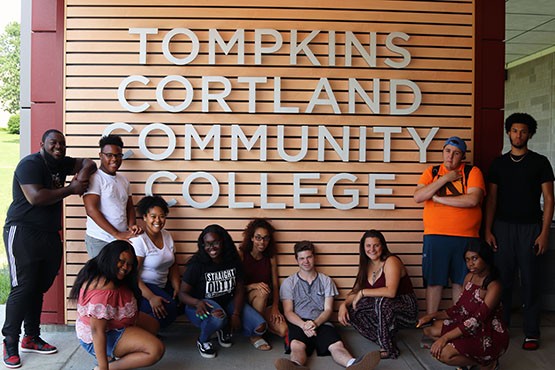Are you looking for Community colleges, the Definition of community colleges, the Benefits of community colleges, the Ranking of community colleges, Requirements of community colleges, and Free and online Courses of community colleges? Then you are at the right place. In this article, we are going to discuss all the topics.
If you’re looking to further your education or learn a new skill, you may want to consider community colleges. These institutions offer a variety of courses and programs at an affordable price point, making them an attractive option for many students.
Community college meaning a college providing further and higher education for people living in a particular area. Community colleges are known for their smaller class sizes, flexible schedules, and personalized attention from instructors. Plus, they often have partnerships with local businesses and industries, providing students with hands-on experience and networking opportunities.
And the best part? Many community colleges now offer free online courses and programs, allowing you to learn from the comfort of your own home. These free resources can be a great way to supplement your education or explore new topics without breaking the bank. So why not check out what your local community college has to offer and see where your education can take you?
Definition of a Community College | What is Community College USA?
Definition of Community college: Community colleges USA are institutions that offer two-year programs and courses in a variety of fields, from nursing to business to computer science. Unlike four-year colleges and universities, community colleges generally focus on practical, hands-on training that can lead to a specific career path or transfer to a four-year school.
One major difference between community colleges and four-year schools is the cost. Community colleges are often much more affordable, making them a great option for students who want to save money on tuition or avoid taking out hefty loans. In fact, many community colleges offer financial aid and scholarships to help offset the cost of tuition and textbooks.
Another advantage of attending a community college is the flexibility it provides. Many community colleges offer night and weekend classes, as well as online courses, to accommodate students who work or have other responsibilities. Plus, the smaller class sizes at community colleges mean you’ll have more one-on-one time with instructors and a better chance of getting the help you need.
Overall, community colleges are a great option for anyone who wants to further their education or learn new skills without breaking the bank. Whether you’re just starting out or looking to switch careers, a community college program can help you achieve your goals.
Free Online Courses and Programs of Community College
Community colleges offer a wide range of free online courses and programs that can help you achieve your goals. In this article, we’ll give you an overview of what community colleges have to offer, the types of courses and programs available, and how to find them.
Free online courses and programs are a great way to learn something new or enhance your existing skills, without breaking the bank. Community colleges, which are institutions that offer two-year associate degrees, certificates, and vocational training programs, are now offering free online courses and programs in various fields.
These courses and programs are designed to help individuals acquire new skills or enhance their existing ones, without the need to attend classes in person.
Some of the most popular types of free online courses and programs offered by community colleges include computer programming, business management, healthcare, and education. These courses range from short-term certificate programs to full-fledged associate degree programs.
For instance, if you’re interested in learning programming languages like Python, Java or C++, many community colleges offer free courses that can help you get started. Similarly, if you’re looking to advance your career in healthcare, you can take free online courses in medical terminology, anatomy and physiology, and nursing assistant training.
To find free online courses and programs offered by community colleges, there are several ways you can go about it. Firstly, you can visit the website of your local community college and check out the online courses and programs section.
Secondly, you can browse the websites of other community colleges in your state or region to see what they have to offer. Lastly, you can also check out MOOC platforms such as Coursera, EdX, and FutureLearn, which offer a range of free online courses and programs from various community colleges around the world.
In conclusion, free online courses and programs offered by community colleges are a great way to learn new skills or enhance your existing ones. Whether you’re interested in computer programming, healthcare, business management, or education, community colleges have something to offer.
So why not take advantage of these opportunities and start learning today? Remember, knowledge is power, and with free online courses and programs, you can acquire that knowledge without spending a dime.
Community Colleges Across the Country
Are you looking for free online courses and programs offered by community colleges across the country? Look no further! We’ve compiled a list of community colleges from different states that offer free online courses and programs. In this article, we’ll give you a brief description of each college and its programs, and tell you how to apply and enroll in these courses.
- Montgomery College, Maryland Montgomery College offers a range of free online courses and programs in areas such as computer science, business management, healthcare, and education. To apply, simply visit their website and choose the course you’re interested in. You’ll need to create an account and complete an application form. Once your application is approved, you can enroll in the course.
- Los Angeles City College, California Los Angeles City College offers free online courses in a variety of subjects, including accounting, marketing, and computer science. To enroll, you’ll need to create an account on their website and complete an application form. Once you’re accepted, you can start taking the course right away.
- Austin Community College, Texas Austin Community College offers free online courses in areas such as business, computer science, and healthcare. To enroll, you’ll need to visit their website and choose the course you’re interested in. You’ll then need to complete an application form and submit it for review. Once your application is approved, you can start taking the course.
- Borough of Manhattan Community College, New York Borough of Manhattan Community College offers free online courses in subjects such as art, business, and science. To enroll, you’ll need to create an account on their website and complete an application form. Once your application is approved, you can start taking the course.
- Wake Technical Community College, North Carolina Wake Technical Community College offers free online courses in areas such as healthcare, education, and business. To enroll, you’ll need to visit their website and choose the course you’re interested in. You’ll then need to create an account and complete an application form. Once your application is approved, you can start taking the course.
To apply and enroll in free online courses and programs offered by community colleges, you’ll generally need to create an account on their website and complete an application form. Some colleges may require additional documents or information, such as transcripts or proof of residency. Make sure to read the instructions carefully and follow them closely to ensure a smooth application process.
The Department of Education estimates that there are more than 1,400 community colleges in the US. More than 1,000 public colleges and universities offer two-year degrees in a variety of fields, including the liberal arts, sciences, general studies, and health professions.
Community colleges awarded well over 800,000 associate degrees in 2019 alone. More and more high school graduates are selecting community colleges over four-year universities, according to Community College Review. The current status of the economy means that this trend is likely to continue.
community colleges across the country offer a range of free online courses and programs that can help you learn new skills or enhance your existing ones. Whether you’re interested in business, healthcare, education, or computer science, there’s something for everyone. So why not take advantage of these opportunities and start learning today? With a little bit of effort, you can acquire valuable knowledge and skills without spending a dime.
- community colleges in usa
- community colleges in usa for international students
- community colleges in california
- community colleges in texas
- community colleges in chicago
- community colleges of spokane
- community colleges in australia
- community colleges in new york
- community colleges in america
- community colleges in boston
- community colleges in illinois
- community colleges in california for international students
- community colleges in uk
- community colleges with dorms
Ranking of Community Colleges
If you’re considering attending a community college, you may be wondering how they rank compared to each other. In this article, we’ll give you an overview of the ranking of community colleges and what factors are considered when ranking them.
First, it’s important to note that community colleges are not typically ranked in the same way that four-year colleges and universities are. This is because community colleges serve a different population of students and have different goals and outcomes. However, there are still ways to compare and evaluate community colleges based on various factors.
- Graduation and transfer rates: One of the most common ways that community colleges are evaluated is through graduation and transfer rates. This measures the percentage of students who complete their program or transfer to a four-year college or university. Community colleges with high graduation and transfer rates are generally considered more successful and may have a higher ranking.
- Quality of their programs and faculty: Another factor that can affect the ranking of community colleges is the quality of their programs and faculty. This includes factors such as student-to-faculty ratio, availability of support services, and the variety and rigor of academic programs. Community colleges with strong academic programs and dedicated faculty are likely to have a higher ranking.
- Affordability and accessibility: Additionally, community colleges may be ranked based on their affordability and accessibility. This includes factors such as tuition costs, financial aid availability, and geographic location. Community colleges that are affordable and accessible to a wide range of students may have a higher ranking.
It’s important to keep in mind that rankings are just one factor to consider when choosing a community college. Ultimately, you should choose a college that meets your individual needs and goals. Some community colleges may be better suited for certain career paths or have stronger partnerships with local employers.
while community colleges may not be ranked in the same way as four-year colleges and universities, there are still factors that can affect their ranking and evaluation. Graduation and transfer rates, program quality and faculty, and affordability and accessibility are all important factors to consider when evaluating community colleges. Remember to choose a college that meets your individual needs and goals, and don’t rely solely on rankings to make your decision.
Community College Examples
community college examples: Let’s examine several exceptional community colleges and what makes them special.
The State Technical College of Missouri, usually known as State Tech for short, has been ranked as the best community college in the US by WalletHub based on a combination of educational outcomes, career outcomes, and cost-financing choices. State Tech touts a 73% graduation rate and a 99% job placement record, and some of its graduates even earn more than their peers with bachelor’s degrees. In 2018, Forbes named it the “3rd-best 2 year college” in the country.
Davidson Davie community college:
Davidson-Davie Community College is a public community college located in North Carolina, USA. It offers a variety of programs and courses, including transfer programs, career and technical education, and workforce development. The college aims to provide affordable, high-quality education to students and support the economic development of the community.
Brightspace Suffolk county community college
Brightspace is the learning management system (LMS) used by Suffolk County Community College (SCCC) to deliver online courses and programs. It is a user-friendly platform that enables students to access course materials, submit assignments, participate in discussions, and take quizzes and tests from any device with an internet connection.
Ellsworth community college softball roster
ellsworth community college softball roster: Williams, er Steckel, who is now in his fourth season as the defensive line coach at Southeast Missouri State football, played defensive line after graduating from Oakville High School in St. Louis at Ellsworth Community College in Iowa.
Benefits of Community College
Benefits of Community College: Are you looking to expand your skillset or advance your career but don’t want to break the bank? Look no further than free online courses and programs offered by community colleges! In this article, we’ll explore the many benefits of community college.
First and foremost, the biggest advantage of free online courses and programs from community colleges is, well, that they’re free! This means that you can gain valuable knowledge and skills without having to worry about the cost of tuition or textbooks. Plus, since these courses are often offered online, you can complete them from the comfort of your own home and on your own schedule.
But the benefits of free online courses and programs go beyond just the cost and convenience. These courses can also help you in career development and skill enhancement. For example, if you’re looking to switch careers or move up the ladder in your current field, taking relevant courses can help you gain the skills and knowledge you need to succeed. And even if you’re not looking to make a big career move, learning new skills can help you become a more well-rounded and knowledgeable individual.
Don’t just take our word for it, though. Here are some testimonials from students who have completed free online courses and programs from community colleges:
“I was able to take a few coding courses for free and it really helped me land my current job as a software engineer. I wouldn’t have been able to afford to take those courses otherwise.” – John, 28
“I wanted to learn more about social media marketing, and the free course offered by my local community college was perfect. I was able to learn a lot and even got a certification out of it.” – Sarah, 32
“I took a few Spanish courses online for free and it’s been really helpful in my job as a teacher. I can communicate better with my students and their families.” – Emily, 35
Free online courses and programs offered by community colleges are a great way to enhance your skills and advance your career without breaking the bank. Not only are they free and convenient, but they can also help you gain valuable knowledge and experience that can benefit you in many aspects of your life.
Requirements for Community College
Requirements for Community College: Community colleges offer a lot of benefits, including lower tuition costs and smaller class sizes. But before you jump in, it’s important to know what the requirements are for attending a community college.
First of all, most community colleges have open enrollment, which means that anyone who has a high school diploma or GED can attend. However, some community colleges may require you to take a placement test to determine your skill level in math and English. This is to ensure that you are placed in the appropriate level of courses and receive the support you need to succeed.
Another requirement for attending community college is to pay tuition and fees. While community colleges are generally more affordable than four-year colleges and universities, you will still need to pay for your education. However, many community colleges offer financial aid and scholarships to help offset the cost. Be sure to check with the financial aid office at the college you are interested in attending to see what options are available to you.
In addition to meeting the academic and financial requirements, community colleges may also have specific requirements for admission to certain programs. For example, some programs may require you to have completed certain high school courses or have a certain GPA. It’s important to research the program you are interested in to make sure you meet all the requirements before applying.
Lastly, community colleges may also require you to attend an orientation or meet with an advisor before registering for courses. This is to ensure that you are aware of the resources available to you and have a clear understanding of what to expect during your time at the college.
what is a community college vs university
A community college is a type of educational institution that offers a range of courses, often at a lower cost, to local residents in the surrounding community. These colleges typically offer two-year associate degrees, vocational and technical training programs, and adult education classes. They are often more affordable and accessible than traditional four-year universities.
In contrast, a university is a higher education institution that offers undergraduate and graduate degree programs in a wide range of fields. Universities are typically larger than community colleges and offer a more diverse range of courses and majors. They also tend to have more resources, such as research facilities and extensive libraries, and often require a higher level of academic achievement for admission.
Overall, community colleges and universities both offer valuable educational opportunities, but differ in their scope and focus. Community colleges can be a great option for those looking for affordable and accessible education, while universities offer a more comprehensive educational experience and often have a stronger emphasis on research and academic rigor.
Community college USA for international students
If you’re an international student looking for an affordable option to study in the USA, community colleges might be the perfect fit for you. Community colleges offer a wide range of academic programs at a lower cost compared to traditional four-year universities. These schools are often more accessible, with smaller class sizes and a supportive environment that can help you adapt to American culture and education.
Plus, many community colleges offer intensive English language programs to help non-native speakers improve their language skills. By starting your education at a community college, you can save money on tuition while still receiving a high-quality education that can help you transfer to a four-year university or enter the workforce. So if you’re looking to study in the USA, don’t overlook the opportunities offered by community colleges!
Conclusion:
Congratulations on reaching the end of this article! By now, you should have a good understanding of community colleges and the benefits they offer, especially through their free online courses and programs. Let’s quickly recap some of the advantages we covered.
Firstly, community colleges offer affordable education and flexible schedules, which can be a great fit for working adults, high school graduates, and anyone else seeking higher education.
Additionally, free online courses and programs from community colleges can help you develop new skills and advance your career, without the burden of student loan debt. You can learn at your own pace, from anywhere with an internet connection, and gain the same knowledge and credentials as traditional students.
Finally, community colleges are inclusive and welcoming, offering a diverse community of learners from all walks of life. Whether you’re a first-generation college student or a non-traditional learner, community colleges can provide the support and resources you need to succeed.
Community Colleges FAQ
Is community college free in CA?
In California, community college is not completely free, but there are programs like the California College Promise Grant that cover tuition fees for eligible students who demonstrate financial need.
Is community college free?
Most community colleges are not free. In some states and through certain programs, community college may be free or low-cost for eligible students. However, in most cases, students are required to pay tuition and fees.
What does community mean in college?
In college, the term “community” usually refers to a group of people sharing a common goal or interest, such as a student organization, a department, or a residential community.
Is community college harder than college?
There is no straightforward answer, as it depends on the individual’s experience and perception. However, community colleges typically have lower admission requirements and smaller class sizes, which can lead to a more personalized and supportive learning environment.
Also Read:
- USC Marshall School Of Business Acceptance Rate
- BEST ONLINE MBA PROGRAMS FOR SUPPLY CHAIN MANAGEMENT
For Know More, Kindly Visit >> TheTomatoPost.com



